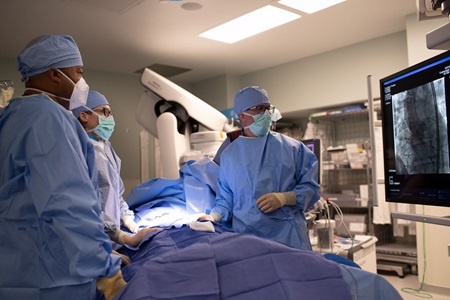The aortic valve is the last valve before the blood leaves the heart and travels to the rest of the body. It serves as a gateway between the heart's main pumping chamber (left ventricle) and the main artery that supplies oxygen-rich blood to your body (aorta). As we age, some people develop a thickening of this valve, causing it to stick and not open well. This can result in two common conditions:
- Aortic stenosis: The valve becomes narrowed and doesn’t fully open, limiting blood from flowing out of the heart and into the rest of the body.
- Aortic regurgitation or insufficiency: Blood leaks back (“regurgitates”) into the heart instead of flowing forward and supplying blood to the organs.
These conditions make the heart work harder to pump blood to the body. Eventually this will cause a weakening of the heart muscle and increase the risk of irreversible damage and heart failure.
Symptoms of Aortic Valve Disease
- Shortness of breath, particularly during exertion
- Chest pain (angina)
- Heart palpitations
- Weakness and tiredness
- Dizziness and fainting
Treatment Options

Until recently, open-heart surgery has been the standard treatment for aortic valve stenosis. This is a safe and effective treatment for most patients; it involves opening the breastbone (sternotomy), and requires a hospital stay of, on average, 5-8 days, with full recovery at 2 months. This option includes the ability to repair other structures in the heart during the same surgery if it is needed (clogged arteries, aneurysms, other broken valves).
Transcatheter Aortic Valve Replacement (TAVR)
Erlanger offers a minimally invasive option called Transcatheter Aortic Valve Replacement (TAVR) for patients with aortic stenosis. In this procedure, our Structural Heart team delivers a replacement valve to the heart through a small tube in the leg. TAVR doesn’t require general anesthesia and offers a much shorter recovery time. Patients are able to go home as early as the next morning.
Our Structural Heart team will work with you to understand these options, and help you choose a treatment course based on your unique preferences and values.

